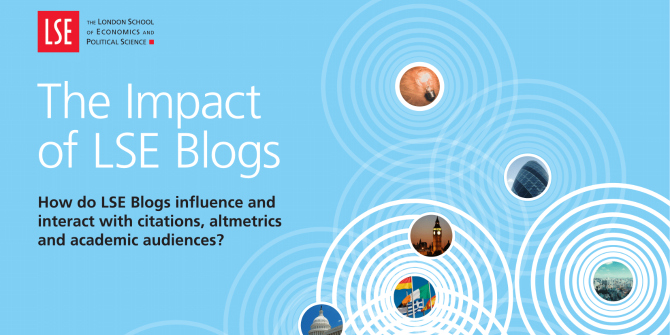 Citing your own work when publishing a paper may be seen as a way of promoting yourself in academia, as how frequently a paper is cited is often viewed as a measure of its importance. Previous studies have shown that male authors are more likely than their female counterparts to cite themselves, arguably one of the reasons men continue to dominate the academic profession. Reporting on recent research, Nick Deschacht finds that authors from western, individualist cultures are more likely to use many self-citations than authors from more collectivist cultures. Findings demonstrate the need for academic institutions to be aware of the cultural and gendered nature of self-promoting behaviour when making hiring and promotion decisions.
Citing your own work when publishing a paper may be seen as a way of promoting yourself in academia, as how frequently a paper is cited is often viewed as a measure of its importance. Previous studies have shown that male authors are more likely than their female counterparts to cite themselves, arguably one of the reasons men continue to dominate the academic profession. Reporting on recent research, Nick Deschacht finds that authors from western, individualist cultures are more likely to use many self-citations than authors from more collectivist cultures. Findings demonstrate the need for academic institutions to be aware of the cultural and gendered nature of self-promoting behaviour when making hiring and promotion decisions.
There is no second chance to make a first impression. In competitive contexts, such as job interviews, individuals tend to engage in self-promotion by emphasising their strengths in order to make a good impression. However, it remains unclear just how important self-promotion is because such tactics are hard to observe. A number of recent studies suggest that self-citations in academic articles are an interesting measure of self-promotion. Self-citations can easily be observed and as a paper’s number of citations often functions as a measure of its importance, self-citation in effect amounts to self-promotion. An early study on self-citations reported by The Economist, found that male authors are more likely to cite their own papers. It suggests this might be one of the reasons why men continue to dominate the academic profession.
A new study by colleagues at KU Leuven and me, published in the Journal of Occupational and Organizational Psychology, confirms the gender gap in self-citations but finds the cultural background of authors to be even more important. We looked at the number of self-citations in 1,346 journal articles published between 2009 and 2014 in the fields of management and business. As can be seen from Figure 1, authors residing in countries with an “individualist culture” are much more likely to use many (five or more) self-citations. Such individualist cultures, like those of the UK and the US, tend to emphasise the personal development of people, whereas in eastern countries with more collectivist cultures there is greater emphasis on group loyalty.
 Figure 1: Relation between culture and the rate of self-citations. The line shows the linear best-fit relation for the data points shown in the graph. Source: Deschacht, N. and Maes, B. (2017). Cross-cultural differences in self-promotion: A study of self-citations in management journals, Journal of Occupational and Organizational Psychology, 90, 77–94. Published by Wiley. © The British Psychological Society.
Figure 1: Relation between culture and the rate of self-citations. The line shows the linear best-fit relation for the data points shown in the graph. Source: Deschacht, N. and Maes, B. (2017). Cross-cultural differences in self-promotion: A study of self-citations in management journals, Journal of Occupational and Organizational Psychology, 90, 77–94. Published by Wiley. © The British Psychological Society.
Of those authors living in countries with an individualist culture, 13% use many self-citations, as opposed to just 7% of those authors from countries with a collectivist culture. This gap is substantially wider than the gap in self-citations between male authors (13%) and female authors (10%). Our study also finds that the gender gap in self-citations is remarkably stable across cultures; the effect of gender on self-citation is no different in individualist countries than in collectivist countries. This suggests that closing any gender gap in self-promotion may not be an easy task.
Of course, authors do not cite their own papers merely to inflate their citation rates. Authors may refer to previous work to limit the length of their articles instead of having to recapitulate. Also, the country of residence of an author may not be an accurate measure of his or her cultural background. This applies especially to the academic labour market which is one of the most globalised in the world. To account for this issue, we not only looked at the authors’ place of residence, but we also used a computer algorithm to classify author names into ethnicities. For example, Ian Foster was classified as English, and Kang Shin as Korean. Using this name-based ethnicity rather than the location of residence as a measure of cultural background confirmed our main finding that self-citations greatly vary across cultures. We also found interesting interactions between ethnicity and country of residence. For example, the self-citation rate of ethnic Koreans residing in the US (10%) is somewhere in between that of ethnic Koreans living in South Korea (5%) and that of ethnic English authors in the US (17%). Although this suggests that self-promotion is subject to a process of cultural assimilation, we do not see the same pattern among ethnic Chinese residing in the US; they have the same, low self-citation rate as ethnic Chinese authors living in China (8%).
These findings demonstrate the need for academic departments and employers in general to be aware of the cultural and gendered nature of self-promoting behaviour when making hiring and promotion decisions.
This blog post is based on the author’s co-written article, “Cross-cultural differences in self-promotion: A study of self-citations in management journals”, published in the Journal of Occupational and Organizational Psychology (DOI: 10.1111/joop.12162).
Featured image credit: play a trumpet.. by funca88 (licensed under a CC BY 2.0 license).
Note: This article gives the views of the author, and not the position of the LSE Impact Blog, nor of the London School of Economics. Please review our comments policy if you have any concerns on posting a comment below.
About the author
Nick Deschacht is a labour economist and assistant professor at the Faculty of Economics and Business of KU Leuven, Belgium.








Interesting findings